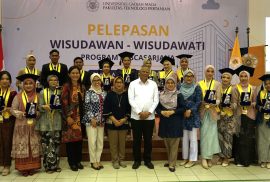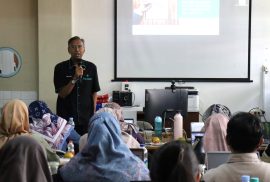
Yogyakarta, October 22, 2025 — The Department of Food and Agricultural Product Technology (TPHP), Faculty of Agricultural Technology, Universitas Gadjah Mada, held a Guest Lecture for first-semester undergraduate students of Food and Agricultural Product Technology. The session featured Bauer Andreas, MMSc from the Institute of Development Research, University of Natural Resources and Life Sciences (BOKU) Vienna, Austria, as the speaker. This event also supports the 4th Sustainable Development Goal (SDG), namely Quality Education.
 In his lecture, Bauer Andreas began by introducing the academic profile, culture, and learning structure of BOKU Vienna, emphasizing the importance of interdisciplinary collaboration in research and education. He explained that students at BOKU are encouraged to develop independent learning habits, conduct data-driven research, and engage in critical discussions.
In his lecture, Bauer Andreas began by introducing the academic profile, culture, and learning structure of BOKU Vienna, emphasizing the importance of interdisciplinary collaboration in research and education. He explained that students at BOKU are encouraged to develop independent learning habits, conduct data-driven research, and engage in critical discussions.
The main topic presented by Bauer Andreas was the CCAST Program (Climate Change and Society Transformation), which links climate change issues with various social crises, including food crises. Through his presentation, he highlighted the importance of understanding societal transformation, governance, and food system adaptation in responding to climate change. Students were encouraged to explore the connections between climate dynamics, ecosystem impacts, food production, and socio-demographic implications.
 In addition, he elaborated on the concept of Food System & Ecosystem Management, where the food system is viewed not merely as a process of food production, but as a complex socio-ecological network. The analytical approach includes aspects of population, food distribution, sustainability, and ecosystem capacity. Students are challenged to understand the interrelation between technical and sociological factors in the global food system.
In addition, he elaborated on the concept of Food System & Ecosystem Management, where the food system is viewed not merely as a process of food production, but as a complex socio-ecological network. The analytical approach includes aspects of population, food distribution, sustainability, and ecosystem capacity. Students are challenged to understand the interrelation between technical and sociological factors in the global food system.
Through this guest lecture, it is expected that new TPHP UGM students will develop a scientific, data-driven, and practical approach to addressing real-world problems. In the long term, they are expected to be able to map complex issues and contribute to policy formulation and concrete interventions in the fields of food security and environmental sustainability.
Writer: Okta I. Latifa




